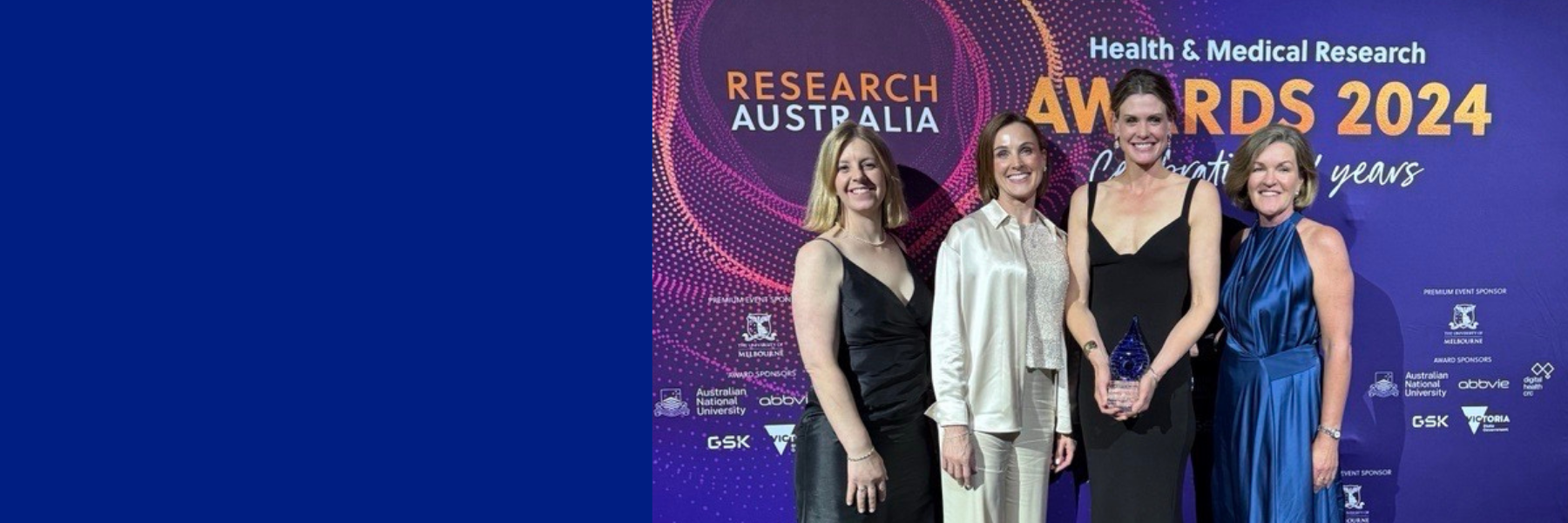Australia’s first electronic screening and risk prediction tool for deterioration in aged care residents has won another national prize for its positive impact on health and safety.
The Research Australia’s Health and Medical Research Awards recognised the digital health tool developed by RMIT University and Telstra Health, in collaboration with the Digital Health Cooperative Research Centre (DHCRC), as award winners of the Digital and Data Health Innovation Award for 2024.
This innovation is Australia’s first electronic screening and risk prediction tool for aged care residents and represents a vital step toward fulfilling the Royal Commission into Aged Care’s goal of protecting and improving the safety, health, wellbeing, and quality of life for those receiving government-funded aged care.
Detecting health deterioration in frail residents is notoriously difficult, as early signs are often subtle and involve a complex mix of physical, mental, and functional factors that conventional hospital tools can overlook.
Persistent workforce shortages further challenge aged care facilities’ ability to consistently monitor for these signs, resulting in nearly 40% of aged care residents being transferred to hospitals each year. Research suggests that 13-40% of these transfers could be prevented through early detection and intervention.
In response to these challenges, the team from RMIT, Telstra Health, and the DHCRC developed a groundbreaking tool that uses natural language processing and machine learning to automatically analyse data from electronic records.
This tool continuously monitors residents’ data for 36 evidence-based markers of deterioration, providing near-real-time predictions of risks like falls, depression, and mortality. The results are displayed on a dashboard, allowing staff to monitor both individual residents and overall trends, supporting timely, proactive decisions to get residents the care and support they need.
RMIT’s project lead and data scientist, Dr Tabinda Sarwar, said the diversity of aged care facilities made adapting AI-powered tools complex, with each provider demanding tailored solutions to support their unique workflows and expectations.
“This project wasn’t a one-size-fits-all approach. We had to consider the specific needs of each facility and that is what makes this achievement so significant,” Dr Sarwar said.
The team’s commitment to real-world impact is evident in the collaboration with gerontologists and aged care staff. By analysing historical data and employing innovative predictive analytics techniques, the tool has the potential to benefit over 60,000 elderly residents.
The tool has undergone rigorous clinical validation and usability studies by nursing staff, ensuring its effectiveness and usability in real-world settings.
“We couldn’t have achieved this without working closely with care staff on the ground,” Dr Sarwar said. “Their expertise and assistance have been invaluable in ensuring our solutions are not just effective, but also practical and relevant to the daily challenges faced in aged care.”
Telstra Health’s Chief Health Officer, Dr Monica Trujillo said “Our recognition with the Digital and Data Health Innovation Award for the Deteriorating Resident Index underscores our commitment to transforming safety and quality in aged care and reflects the hard work of our partners at RMIT and the Digital Health CRC, who share our vision of using innovative technology to proactively identify health deterioration in frail residents.
“By harnessing natural language processing and machine learning, we are not only improving resident outcomes but also supporting care providers with actionable insights to make timely, life-saving decisions.
“This milestone marks a crucial step forward in creating safer, higher-quality aged care environments,” said Dr Trujillo.
DHCRC CEO Annette Schmiede said the Australian-first innovation demonstrated how routinely collected data could be used to ensure elderly people received the care they deserved while easing growing demands on healthcare providers.
“Caring for Australia’s rapidly ageing population, even in one of the best healthcare systems in the world, has its challenges. Innovative digital health tools, like the one developed by RMIT and Telstra Health, can ensure that aged care residents receive timely, personalised care and reduce the incidence of stressful and costly emergency interventions,” Ms Schmiede said.
“Being recognised by Cooperative Research Australia at their Excellence in Innovation Awards earlier this year, and now Research Australia at the Health and Medical Research Awards, is a true testament to the hard work and dedication of all those involved to address one of the most significant challenges in Australia.”
Research Australia’s Health and Medical Research Awards were held in Melbourne last night and celebrate the outstanding talent within Australia’s health and medical research community. These prestigious awards honour the remarkable achievements of individuals and teams who drive innovation and advancements that enhance our lives.
CEO of Research Australia, Nadia Levin, said Research Australia proudly recognises these achievements, advocating for the entire research ecosystem.
“We congratulate all winners of our Health and Medical Research Awards and commend them on their efforts to help position Australia as a global leader in their fields,” she said.

 Visit
Visit 
